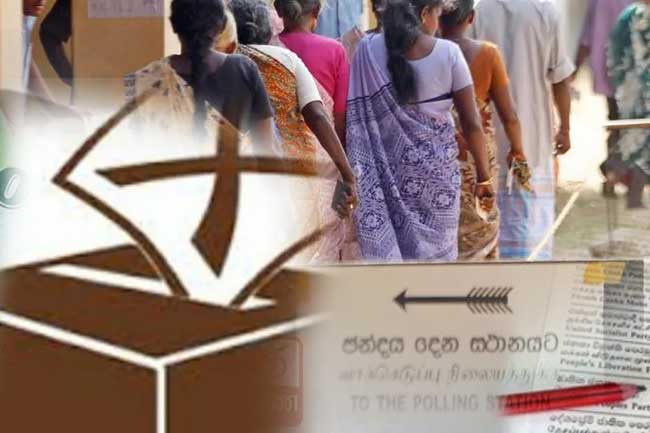Sri Lanka is set to hold its Parliamentary Elections on 14 November 2024, selecting 225 representatives for the new Parliament. This decision follows President Anura Kumara Dissanayake’s dissolution of Parliament on 24 September 2024, using powers granted by Article 70 of the Constitution, through an Extraordinary Gazette (No. 2403/13). In line with Section 10 of the Parliamentary Elections Act of 1981, this election date was scheduled, and the new Parliament is expected to convene on 21 November 2024.
The previous Parliament’s term was initially set to end in August 2025, but President Dissanayake, elected in the 2024 Presidential Election, had promised during his campaign to expedite parliamentary reforms by calling for an early election.
Election Structure and Voter Information
This election will engage over 17.1 million eligible voters across 22 multi-seat constituencies. Gampaha District has the highest number of eligible voters, at 1,881,129, while the Vanni District, with 306,081 voters, has the lowest. Voters can support a party or independent group and may also mark up to three candidates from that group. Alternatively, they may vote solely for a party or group without individual preferences.
Under Sri Lanka’s proportional representation system, 196 members will be chosen from constituencies with a minimum 5% electoral threshold, while the remaining 29 seats will be selected from a national list. Gampaha District will elect the highest number of representatives (19), while Trincomalee will elect the fewest (4).

Nomination Period and Candidates
Nominations for this election took place between 4 October and noon on 11 October 2024. A total of 8,888 candidates will contest, with 5,531 representing registered political parties and 3,357 from independent groups. Out of 788 nominations submitted, 719 were approved, while 69 were rejected. The Colombo District reported the highest number of candidates (966), while Polonnaruwa had the fewest (120). In Digamadulla, 64 out of 72 nominations were accepted, and in Nuwara Eliya, 7 nominations were rejected.

Key Figures Opt Out and Noteworthy Developments
Notably, 59 former MPs, including prominent leaders like Ranil Wickremesinghe, Mahinda Rajapaksa, Maithripala Sirisena, and Basil Rajapaksa, have opted not to contest. Public figures such as social media influencer Ashen Senarathne had their nomination rejected by the Election Commission, claiming the nomination was unauthorized. Senarathne publicly expressed dissatisfaction, indicating potential legal action, while the Election Commission has stated that any aggrieved parties may pursue legal avenues.
There were also surprises in the nominations: actress Damitha Abeyrathne was expected to run for the Samagi Jana Balawegaya (SJB) from Ratnapura but was ultimately excluded from the final candidate list. Ajith Mannapperuma, a former MP, resigned from the SJB and withdrew his nomination for Gampaha shortly after his submission, citing dissatisfaction over organizational issues within the party.
Legal Challenges and Court Rulings
Several candidates filed Fundamental Rights (FR) petitions with the Supreme Court challenging nomination rejections. While the Court dismissed four out of five petitions contesting the nomination rejections, another petition filed by Priyantha Herath, a civil society leader, challenged the constitutionality of holding elections on 14 November. This petition, which named government officials including the Election Commission, was also dismissed by the Supreme Court.
How to Vote in the 2024 General Election
The official polling cards for the 2024 General Election are ready. According to the Department of Posts, 97% of these cards have been distributed. Voters who have not received their polling cards can visit their local post office during working hours to collect them, a service available until election day.
For added convenience, the Election Commission has introduced an online system allowing voters to access their polling cards. Voters can view their cards via the ‘Online Registration’ option on the official Election Commission website.
The Election Commission clarified that voters who have not received their official polling cards can still vote at designated polling centers using a valid form of identification. Acceptable IDs include:
- National Identity Card (old or new)
- Valid passport
- Driver’s license
- State service pensioner’s ID
- Clergy identification issued by the government
- Elders’ identity card
- Temporary identity card issued by the Election Commission for people with disabilities
Service identity cards issued by state ministries, departments, and similar agencies will not be accepted.
To prevent double voting, each voter’s left index finger will be marked with an indelible sign. If a voter’s left index finger is unavailable, the mark will be applied to another suitable finger.
Ballot Paper Format
Ballot papers in the Polonnaruwa, Monaragala, and Kalutara Districts will be in a single-column format, while those for other districts will use a two-column layout. A specimen ballot paper for each district will be provided with the official poll card distributed to each household.
Voters should use only a cross mark (‘X’) when voting and marking preferences. This measure, implemented to prevent confusion, follows similar efforts during the recent 2024 Presidential Election.

Campaign Finance Monitoring and Spending Limits
In a significant step toward transparency, the Election Commission announced campaign finance limits for political parties, independent groups, and individual candidates in accordance with the Election Expenditure Regulation Act No. 03 of 2023. These guidelines are expected to curb excessive spending and encourage a level playing field.



